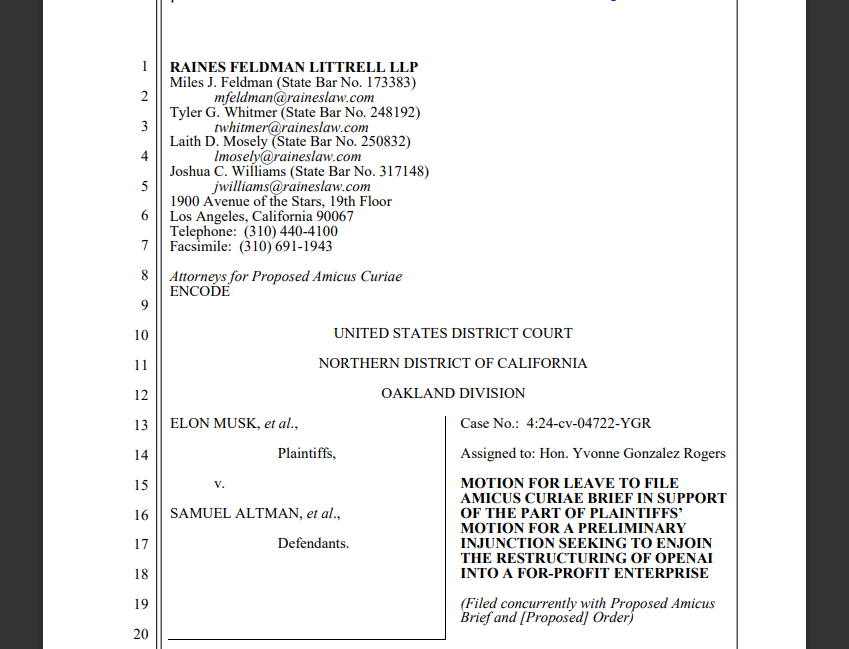Encode, a youth-focused non-profit group that promotes ethical AI creation, recently submitted a supporting document to the U.S. District Court for the Northern District of California, asking it to prevent OpenAI from transforming into a profit-driven organization.
The document submitted as evidence for Elon Musk’s court case indicates a potential risk to public safety and may weaken OpenAI’s dedication towards creating AI systems that prioritize human welfare.
Initially established in 2015, OpenAI’s founding goal was to make certain that artificial intelligence would serve the good of all mankind. But due to significant running expenses, the company transitioned to a hybrid model in 2019, enabling external investments while still maintaining some elements of nonprofit governance.

Currently, the AI firm is planning to transform its revenue-driven section into a Delaware Public Benefit Corporation (PBC). This new structure aims to reconcile shareholder profits with public well-being. However, this transition has sparked significant concerns from organizations such as Encode, who fear that it may prioritize profit over safety.
The transformation of OpenAI poses a significant threat to the robust safety precautions established to safeguard the general public, as it might divert attention from these crucial aspects towards generating profit. As a nonprofit organization, OpenAI operated with the primary goal of serving the public interest and prioritizing safety; however, its shift to for-profit status could potentially alter this focus.
According to this, it implies a decrease in accountability and poses significant ethical concerns regarding artificial intelligence.
Specialists in artificial intelligence have expressed worries about OpenAI undergoing a structural transformation. Geoffrey Hinton, a Nobel laureate in Physics, stated that such a change could imply a worrying emphasis on profits at the expense of safety.
Professor Stuart Russell of UC Berkeley concurred with Hinton’s viewpoint, emphasizing the significance of OpenAI’s nonprofit status to prevent potential hazards in AI advancement. In his words, “It is repugnant to consider that human survival should hinge solely on financial gains and losses of investors.
Elon Musk, one of the initial backers of OpenAI, has publicly expressed disagreement with the proposed changes. Last November, he initiated a legal action against OpenAI, alleging that they have strayed from their original charitable purpose.
The individual asserted that transitioning OpenAI into a for-profit company would diminish resources accessible to other AI startups and potentially establish a monopoly in AI innovation. Elon Musk voiced his opposition to this change on social media, characterizing it as a shift towards closed-source, profit-driven operations that contradicts its initial open-source, nonprofit objectives. In essence, he tweeted, “OpenAI was initially founded with open-source and nonprofit ideals but has since transformed into a closed-source, profit-focused entity.
Encode also emphasizes that OpenAI’s shift occurs at a crucial juncture in AI management. Given the swift advancement of Artificial General Intelligence (AGI), the brief underscores the potential dangers of permitting profit-driven entities to wield such formidable technology.
Artificial General Intelligence (AGI) is expected to bring about substantial changes in our society, and Encode advocates that its primary concern should be the well-being of the public as it progresses. A preliminary injunction hearing has been set before U.S. District Judge Yvonne Gonzalez Rogers on January 14, 2025.
Read More
- Gold Rate Forecast
- Silver Rate Forecast
- Honor of Kings returns for the 2025 Esports World Cup with a whopping $3 million prize pool
- PUBG Mobile heads back to Riyadh for EWC 2025
- USD CNY PREDICTION
- Kanye “Ye” West Struggles Through Chaotic, Rain-Soaked Shanghai Concert
- Arknights celebrates fifth anniversary in style with new limited-time event
- Hero Tale best builds – One for melee, one for ranged characters
- Every Upcoming Zac Efron Movie And TV Show
- Grimguard Tactics tier list – Ranking the main classes
2025-01-06 22:30